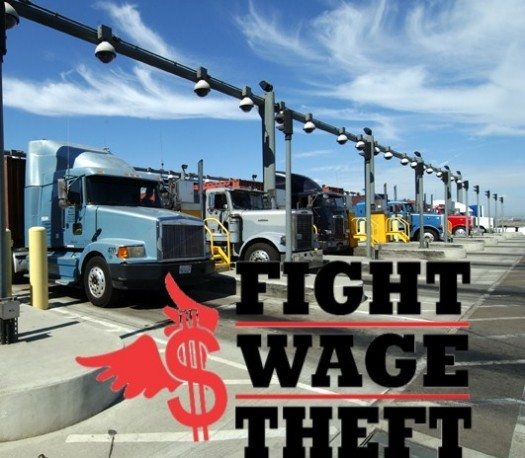
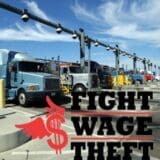
 It’s almost payday. Imagine if you went to cash your paycheck only to find that your employer had instead billed you for the opportunity to work for them.
It’s almost payday. Imagine if you went to cash your paycheck only to find that your employer had instead billed you for the opportunity to work for them.
For drivers at Seacon Logix, paying to work was only the beginning of the abuses they faced from their employer, a midsized port trucking company based in Carson.
A group of nine Seacon Logix drivers has persisted for almost two years in seeking to reclaim their wages even as the company has reached a new low in an already notoriously low-road industry.
Seacon Logix didn’t just evade the law by claiming that its employees were “independent contractors,” allowing it to avoid basic responsibilities, like payroll, income taxes and workers compensation insurance.
It didn’t just pass on its operating costs to drivers and force them to pay for vehicle leases, registration and insurance payments by illegally deducting them straight out of drivers’
» Read more about: How Low Can a Port Trucking Company Go? »
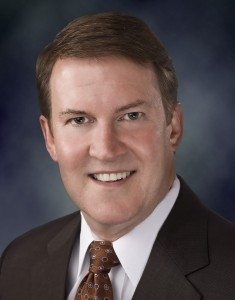

We continue our series of interviews with Los Angeles’ front-running mayoral candidates, with the first part of a talk with Kevin James, an entertainment lawyer and talk-show host, who has previously served as a U.S. prosecutor and AIDS Project Los Angeles co-chairman. (The interviews, which have been edited for clarity, include Eric Garcetti, Parts One and Two, and Wendy Greuel, Parts One and Two.)
Frying Pan News: What do you believe is the role of government in addressing the inequities of the free market system?
Kevin James: A mayor should not shy away from addressing inequality. I was [a] chairman for many years of AIDS Project Los Angeles and part of the work we did was to provide a better life for people who were struggling in theirs —
» Read more about: Kevin James on Bringing Businesses Back to Los Angeles »
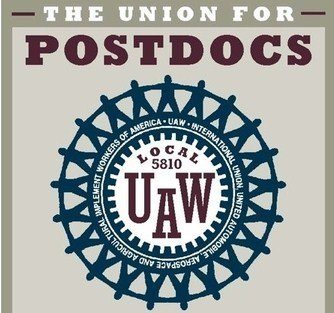
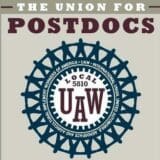
 For the thousands of international students and researchers who come to U.S. universities each year, the academy is seen as a beacon of opportunity, where the people who work the hardest and [have] the best ideas rise to the top.
For the thousands of international students and researchers who come to U.S. universities each year, the academy is seen as a beacon of opportunity, where the people who work the hardest and [have] the best ideas rise to the top.
[To] a union representing more than 6,000 postdoctoral scholars (also known as “postdocs”) at the University of California, this promise means something – the majority of our members are immigrants working in the U.S. on guest worker visas, and they are here because they have worked for years to reach the forefront of biology, physics, engineering and other fields. They have already earned PhDs, and come to UC to perform cutting-edge research – think breakthrough cancer therapies, new models for the origin of the universe, stem cell research and more.
Imagine their surprise when after arriving at UC, they are told that although the contract the union negotiated states that health care coverage is available to all postdocs,
» Read more about: University Postdocs Demand Health Care Rights »


In English, “sequestration” sounds like obscure policy wonk jargon. In Spanish, it has a very simple meaning: “kidnapping.”
The kidnapping of our economy is exactly what’s in store for later this week, unless a last minute deal derails plans to cut $85 billion from the federal budget. Corporate backed politicians like Sen. Tom Coburn (R-OK) claim that the cuts target “an excessive, bloated, big federal government that’s highly inefficient and highly ineffective.” But the truth is that the cuts will slice deep into our most important safety net programs.
What will sequestration mean for our families? According to a simple summary from the non-partisan United Way the effects in Californian’s health and education include the following:


(Editor’s Note: Today we continue our series of posts from invited writers who offer thoughts on what the coming four years hold for Los Angeles and its next mayor. These opinions do not reflect the views of Frying Pan News or the Los Angeles Alliance for a New Economy.)
The next mayor of Los Angeles will have significant environmental matters before them. Let’s take two — water and power.
On energy, the Los Angeles Department of Water and Power is obligated by California law to deliver one third of the city’s electricity with renewable power by the year 2020. The state also mandates that L.A. curtail using sea water to cool its coastal power plants by 2029. State law also sets deadlines for L.A. to get off of coal. And the state also demands that L.A. reduce its energy use by at least 10 percent via new energy efficiency and conservation measures by 2020.
» Read more about: Our Next Mayor Must Grapple with Water and Power »


Source: LearnStuff. Republished with permission.
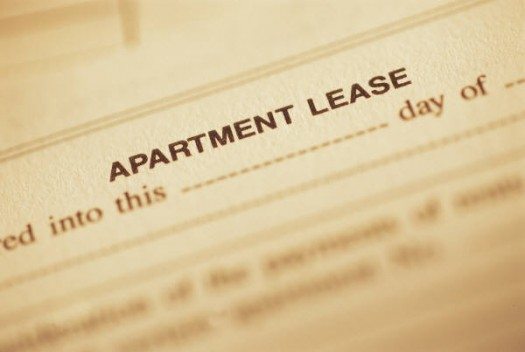

 Tenants Together has launched “It’s Your Money,” a new campaign to stop security deposit theft by California landlords. The campaign website, www.YourDeposit.org, features know-your-rights information for tenants, tips on how to protect deposits, tenant stories and policy recommendations. The site allows tenants to share their security deposit horror stories.
Tenants Together has launched “It’s Your Money,” a new campaign to stop security deposit theft by California landlords. The campaign website, www.YourDeposit.org, features know-your-rights information for tenants, tips on how to protect deposits, tenant stories and policy recommendations. The site allows tenants to share their security deposit horror stories.
Security deposit theft is one of the most common grievances among California’s 15 million renters. In a recent survey, over 60 percent of Tenants Together members reported improper withholding of deposit money. This is an astonishing figure, but not one that surprises anyone working with California tenants.
“Millions of dollars are being stolen from tenants every year,” commented Dean Preston, Executive Director of Tenants Together, California’s statewide organization for renters’ rights. “It’s gotten so bad that tenants paying their security deposits don’t ever expect to see that money again. Something has got to change.”
Unlike in many other states,
» Read more about: Protecting Renters From Security Deposit Theft »
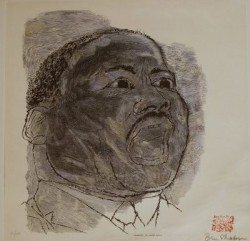

As we settle further into Black History Month, it’s the perfect time to reflect on Martin Luther King Jr. and his often under-acknowledged passion for economic justice. King stands as a pillar of civil rights leadership and the movement for equal rights. His legacy is special to the black community, and as a symbol, he has become an extraordinary role model to all people. However, to see King’s legacy only through this lens would miss much of his work. King was also a union ally and champion of economic justice.
King understood clearly that the battle for racial equality would be empty without a parallel fight for economic equality. “[What] will [the Negro] gain by being permitted to move an integrated neighborhood if he cannot afford to do so because he is unemployed or has a low-paying job with no future?”[i] Having equal rights without the means to exercise those rights becomes an empty promise,


 In his State of the Union Address this month, President Obama called for a much-needed increase to the federal minimum wage. Almost four million American workers are paid at or below the minimum wage of $7.25 an hour for their work, adding up to about $14,500 per year, per person for a full-time, 40 hour per week job. This doesn’t come close to covering the cost of living for a single person, let alone a family.
In his State of the Union Address this month, President Obama called for a much-needed increase to the federal minimum wage. Almost four million American workers are paid at or below the minimum wage of $7.25 an hour for their work, adding up to about $14,500 per year, per person for a full-time, 40 hour per week job. This doesn’t come close to covering the cost of living for a single person, let alone a family.
In the food retail sector, unfortunately, raising the minimum wage might not make much of a difference to those employees that are most vulnerable. Grocery stores and other food retail outlets are already avoiding minimum wage and benefit requirements for many workers by keeping them in part-time jobs. Realistically, if a worker can’t get scheduled for 40 hours per week of work, then minimum wage requirements cease to be effective in ensuring an annual income floor.
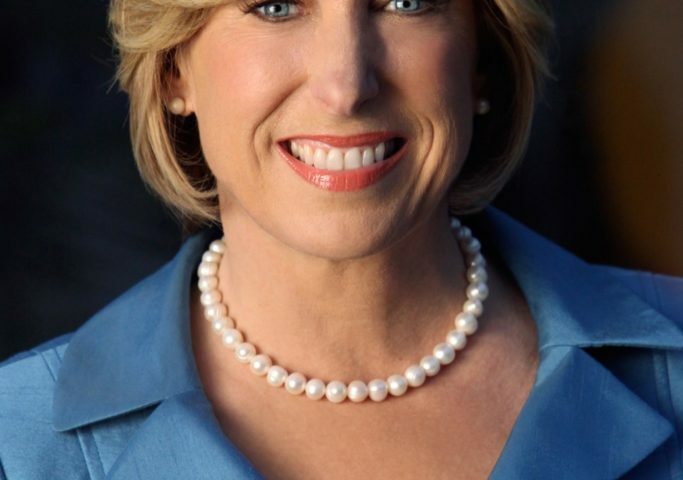

 Today we continue our series of interviews with Los Angeles’ front-running mayoral candidates, with the second part of a talk with City Controller Wendy Greuel. (Next week: Kevin James. See also, Part One of the Wendy Greuel interview, as well as Parts One and Two of our Eric Garcetti interview.)
Today we continue our series of interviews with Los Angeles’ front-running mayoral candidates, with the second part of a talk with City Controller Wendy Greuel. (Next week: Kevin James. See also, Part One of the Wendy Greuel interview, as well as Parts One and Two of our Eric Garcetti interview.)
Frying Pan News: Corporate lobbyists spent more than $30 million last year to influence decisions at City Hall – far more than unions or any other group. Do you think that big business has too much power over local government?
Wendy Greuel: Thirty million dollars is a lot of money. I will, as mayor – as I do as controller and as I did as councilmember — ensure that there is a transparent process and that no one has more access than another to the kinds of decisions that are made in the city.
» Read more about: Wendy Greuel on Lobbyists, Developers and Big Box Stores »